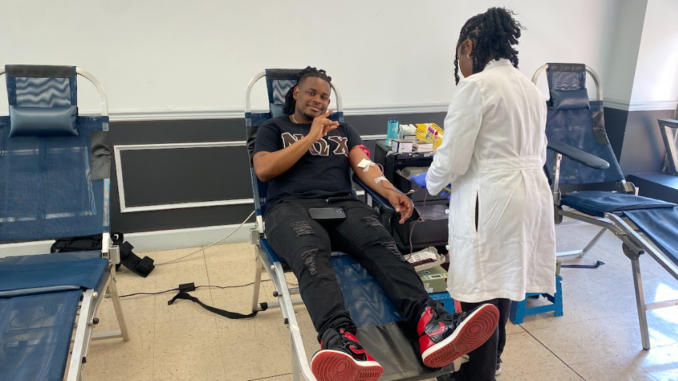
By Giovanni M. Ravalli
Brooklyn College’s Health Programs Office, in collaboration with the Black and Latino Male Initiative and Nu Omega Chi Fraternity, hosted a blood drive at BC on Wednesday, May 8, with the help of the Maimonides Medical Center.
The Maimonides Blood Bank came on campus to collect donations from students and faculty through the five hour long drive on the second floor of the Student Center. According to organizers at BC’s Student Affairs Immunization Department, the crucial goal was to see if the BC community could give back through blood donations.
“I’ve been seeing a lot of commercials and notifications from the blood center saying there’s an emergency crisis,” Latoya Bowen, Health and Wellness Coordinator of the Department, said. “I look at blood like liquid gold. It saves lives. I wanted to see if the Brooklyn College community could give back by donating blood and saving lives.”
A healthy adult has about six quarts of blood and cannot survive a loss of more than two or three. Blood is essential because of the many vital functions it serves. Many reasons could necessitate the need for a blood transfusion: traumatic injury resulting from car crashes, surgical issues, and birth complications. Some medical issues impede the ability to make enough blood cells the body needs to function, and could be fatal without regularly receiving blood through exogenous means. The most common affliction is anemia.
“These are people that look like you and I, who are working every day, they need blood to survive,” said Clotaire Jean-Louis, Supervisor of Maimonides Blood Bank. “They need to go for blood transfusions because they have anemia.”
With a shelf life of 30 days, it’s just as much about the amount of blood stocked for today as well as securing stock for future needs, making consistent blood donation crucial.
“I know firsthand how blood saves lives. I see it every day, and it’s quite remarkable,” Dr. Martin Bluth, Chief of Blood Transfusion and Donor Services at Maimonides Medical Center, told The Vanguard.
Blood has yet to have been replicated in a lab, making it not a viable option to source it from. It’s critical that the blood comes from humans in a timely manner in order to save lives.
“There’s lots of people who need blood every day and right now we don’t have a way to make it artificially, so we only get it when people donate,” Keturah Mapp, Phlebotomist at Maimonides Blood Bank said. “It’s really important that we get a lot of donors coming in, it could help save a lot of lives.”
To students who participated in the drive, it was an opportunity to give back even if it can be a daunting experience.
“Everyone knows someone that has needed blood, and I think if you have it, you might as well give it up,” first-time donor Summer Campbell, a Television, Radio, and Emerging Media major at BC, told The Vanguard. “It really wasn’t that bad, it was nice and smooth.”
The entire process takes about 15 minutes and collects 450 milliliters of blood in total. This equates to less than half of one quart of blood, posing no risk to the donor, and could save up to three lives. According to Bluth, the United States conducts an estimated 21 million transfusions per year, up from 14 million about 10 years ago, and has seven to eight million blood donors.
Since COVID, changes were made regarding the eligibility of those who may donate blood, giving many the ability to donate. Restrictions on the LGBTQ+ community were also lifted, allowing many in the community to donate for the first time.
“When the AIDS epidemic came out, the eligibility of those able to give blood in terms of [the LGBTQ community] was no longer eligible […] About a year ago that entire overtone was completely removed,” Bluth said. “They have lifted it to only new sexual partners within three months, whomever you are, which makes the most sense because that is when the risk of transmission of something that might be percolating in someone’s body is the most realistic. That has actually opened up eligibility to the LGBTQ community.”
Having enough viable blood on hand at all times could be the difference between life or death for those who need it and makes doctors’ jobs easier by lifting the burden of having to make difficult decisions with the current limited supply.
“It’s one of the best ways to contribute to society because you’re giving somebody the gift of life,” said Shafi Ahmed, Phlebotomist at Maimonides Blood Bank. “That’s one of the most important things anybody can receive.”
Students or faculty interested in donating or learning more can visit the fixed donation center at Maimonides Medical Center located at 4802 10th Avenue Brooklyn, NY 11219.
